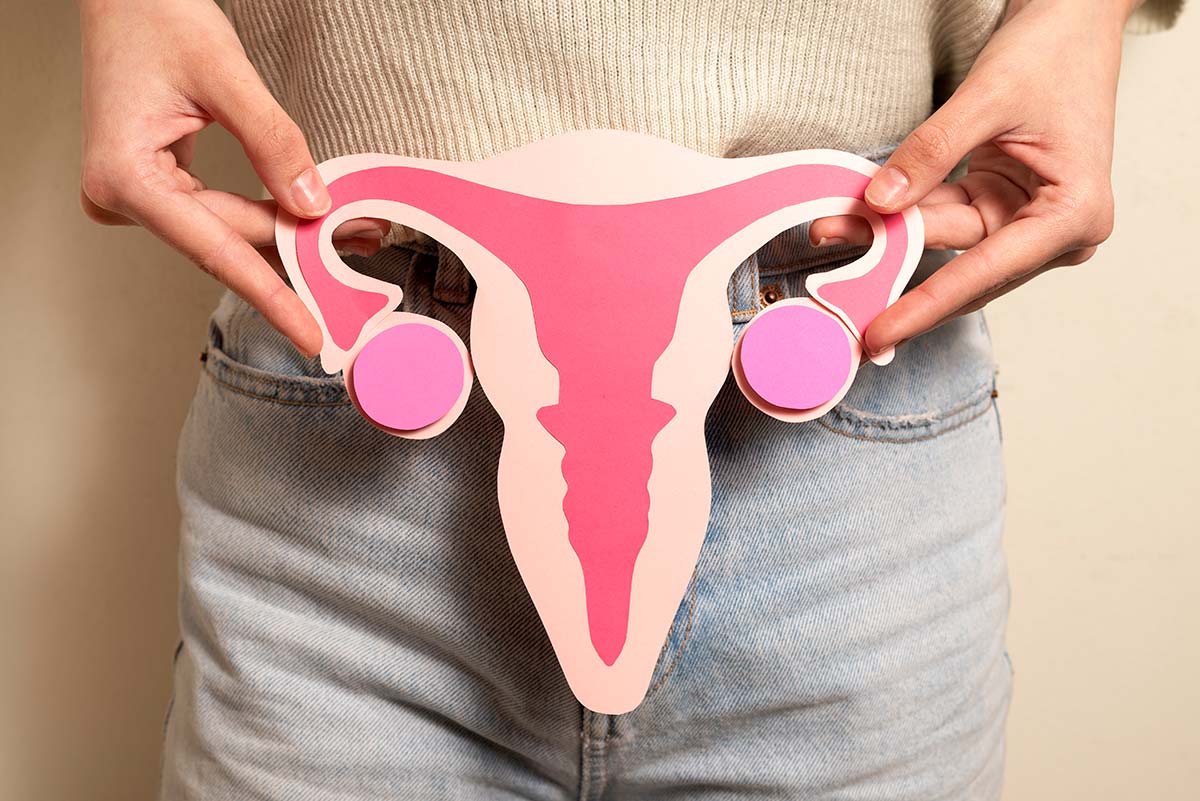Polycystic Ovary Syndrome

Polycystic ovary syndrome (PCOS) is a very common condition due to hormonal imbalance. PCOS is very common and is thought to affect up to half of South Asian women.
Although PCOS may begin soon after the first menstrual period at 11 or 12 years of age, it can also develop in the 20s or 30s, and most women find out they have PCOS when they have trouble getting pregnant. Though the exact cause of PCOS is unclear, it is thought to be related to abnormal hormone levels.
A woman is more likely to have PCOS if their mother or sister has it, if they are obese or have insulin resistance. (i.e. their body cannot use insulin well) or low-grade inflammation (i.e. white blood cells making substances in response to infection or injury).
It is possible to have PCOS and not have any symptoms, which is why most women only realize that they have PCOS when they have trouble getting pregnant or start gaining weight for unknown reasons.
The 3 main symptoms of PCOS are:
- Irregular or absent periods
- Ovaries have multiple cysts (>10) on ultrasound scan
- High testosterone level – acne, facial hair, hair loss
All 3 symptoms are not required for diagnosis – you only need 2 out of the 3.
Some of the other symptoms of PCOS include:
- heavy, light, irregular or absent periods
- infertility or difficulty getting pregnant due to irregular ovulation or no ovulation
- male pattern hair loss or hair thinning
- excessive hair growth particularly on the face, chest, stomach, back and buttocks
- weight gain or difficulty losing weight, particularly around the waist
- oily skin or acne
- pelvic pain
- large ovaries/ ovaries with many cysts
- small pieces of excess skin on the neck or armpits (skin tags)
- dark or thick skin patches on the back of the neck, in the armpits, and under the breasts
While having PCOS does not automatically mean you cannot get pregnant, women with PCOS may have issues with fertility and at times could be infertile. Such women are likely to have miscarriages or premature births. They can also develop other health issues such as diabetes, obesity, high blood pressure, problems with the heart and blood vessels, severe liver inflammation, sleep apnea, uterine cancer, depression, anxiety and eating disorders.
Diagnosis
If you have any of the symptoms above, see your doctor and let them know about your family’s medical history and symptoms.
You may be subjected to a:
- pelvic examination to check the reproductive organs and look for causes of abnormal bleeding
- an ultrasound scan to see the size of the ovaries, thickness of the uterine lining and cysts
- blood tests to look for high levels of androgens and other hormones
- hormone tests to find out whether the excess hormone production is caused by PCOS or another hormone-related condition
- physical exam to look for excess facial hair, hair loss, acne and discolored skin and skin tags
- check of blood pressure, weight and cholesterol and screened for diabetes.
Treatment
Lifestyle changes are extremely important. Annual checks on blood pressure and screenings for diabetes are recommended. Detection of high blood pressure or diabetes may result in starting medication. While medication can’t cure PCOS, it helps reduce symptoms and prevents certain health problems.
Treatment for PCOS depends on a number of factors. These may include your age, how severe your symptoms are, and your overall health. The type of treatment may also depend on whether you want to become pregnant in the future.
If you do intend to or plan to become pregnant, your treatment may include: a healthy diet, more physical activity, medication to cause ovulation. If medication does not help you get pregnant, an IVF treatment or a minor surgical procedure called laparoscopic ovarian drilling (LOD) may be a treatment option.
If you do not plan to become pregnant, your treatment may include: a healthy diet, more physical activity, birth control pills to regularize your periods and cause a monthly bleed, insulin-sensitizing medication, diabetes medication (metformin) and medications to treat other symptoms such as hair growth or acne.
The physical symptoms of PCOS, such as weight gain, hair growth, and acne can be treated with cosmetic treatments, such as waxing, electrolysis and laser hair removal.
Fertility is often a concern for women with PCOS. It is important to see a gynaecologist/fertility specialist early if you know you have PCOS and have not yet been able to conceive. Lifestyle measures coupled with medications can improve chances of conceiving. If that does not work, IVF (invitro fertilisation) is the next step.
There’s no proven way to prevent PCOS, but you can take small steps to reduce your symptoms by eating nutritious foods, exercising regularly and managing a healthy weight for your body. If you do have PCOS, know that you are not alone as many women face the challenges of PCOS and with the right help you can keep it in control.
You can call FPA Sri Lanka on 076 588 4881 for any concern or clarification.
.png)



